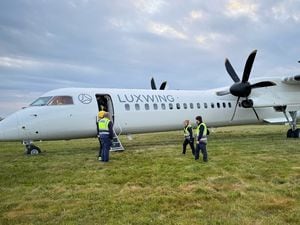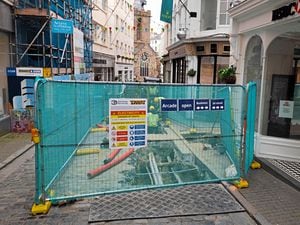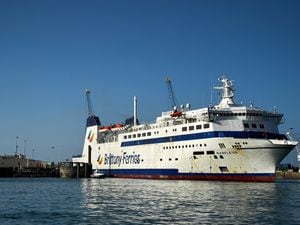Today marks 75 years since the liberation of Biberach
TODAY marks the 75th anniversary of the liberation of the German camp to which more than 800 people from Guernsey were sent during the Second World War.
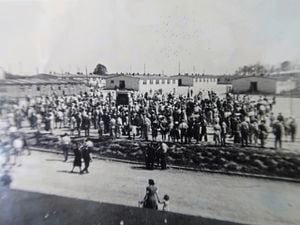
In the early 1940s non-island-born Channel Islanders were deported.
The Biberach camp housed more than 1,300 Allied civilians during the war, including those from Guernsey.
The Guernsey Deportees’ Association was formed in the late 1990s, when a group travelled to southern Germany for a reconciliation week.
Since then there has been a strong link between the town and Guernsey.
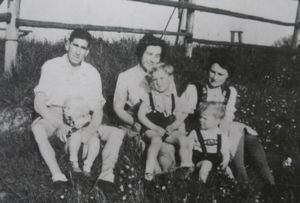
Association chairman Tom Remfrey said when liberation drew close in 1945, many were fearful in Biberach about the advancing Allied forces and German resistance around the camp.
The German camp commandant, Major Mayer, and the British camp captain, Garfield Garland, arranged to send a German civilian towards the Allies to tell them about the existence of the camp.
In the interim, German flags were covered with a white sheet and a red cross of St George, which were to be flown at prominent points to show the advancing Allies.
The German forces established strongpoints in farms and houses to the west of the camp. On 22 April, the French forces, mainly French Moroccan, started their attack towards Biberach and the camp. French tanks entered Biberach, which was declared an open town and offered no resistance.
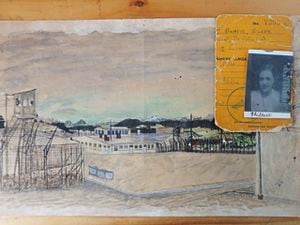
A battle ensued, during which each of the German strongpoints was destroyed.
The only damage to the camp was a stray shell which struck the Red Cross parcels hut and set it on fire. Remarkably, nobody in the camp was injured.
Later in the day German resistance ceased and French officers entered the guardroom, which was manned by British police from the camp, the German civilian guards all having been disarmed.
The Channel Islanders were all repatriated from the end of May back to the UK.
Gloria Dudley-Owen, a member of the friends’ association, was born in Biberach.
Her mother, Gladys Skillett, was sent to the camp with her English husband and one-year-old son in 1942.
On the day of Liberation in 1945, Mrs Skillett wrote to her sister, Norah Mahy, who was living with her family in north Wales.
‘Yes, dears, we are free citizens at last, after two-and-a-half years behind barbed wire,’ she wrote.
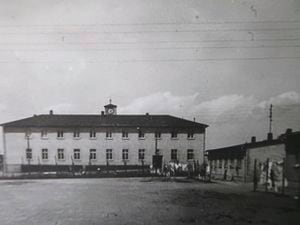
‘What a great joy it had been for us to see our own dear Allies.’
She wrote that it was lovely to hear the English news and music hall again.
She recounts the relief felt in the camp when friendly troops arrived. Despite the presence of the Allies, there were still pockets of resistance in the area and they could hear the occasional rifle shot.
She also described horrors suffered by the Jewish people who had been freed from Belsen the week before.
‘They were in a shocking state through starvation when they arrived at our camp,’ Mrs Skillett wrote.
Visit impossible – but Bailiff sends thanks
IT IS important that the communities of Guernsey and Biberach live in peace with each other, Bailiff Sir Richard Collas has said, as the 75th anniversary of the liberation of the internment camp is marked today.
Sir Richard had been due to visit the town in southern Germany to mark the occasion, but the lockdown has prevented that.
Instead, he sent a heartfelt message to the town on behalf of the Guernsey community.
‘I am grateful to Norbert Zeidler, oberbürgermeister of Biberach, for this opportunity to send this message to the community of Biberach on the occasion of the 75th anniversary of the liberation of Lager Lindele, where so many people from the Bailiwick of Guernsey were imprisoned in the Second World War,’ he wrote.
‘How sad it is that because of Covid-19 you are not able to mark this important occasion in the way which you had planned.
‘I am also extremely sorry not to be able to be with you in person.
‘However, obviously the health of all of us and our communities at a time like this must take priority and we too are cancelling numerous events in an attempt to stop the spread of Covid-19.’
He said it was important the communities stayed linked.
‘I would like to take this opportunity to give my thanks and those of the people of the Bailiwick to all those in Biberach and in Guernsey who have worked so hard to foster links and ensure reconciliation between our two communities after a link which began for all the wrong reasons,’ he wrote.
‘While not forgetting the events of the war, this event is another occasion on which to celebrate the friendship which now exists between our two communities.
‘It is so important that our communities can live in peace with one another and that our children and our children’s children learn to appreciate the value of the freedom that we enjoy today.’
He said he hoped to visit the German town again soon and wished the people good health.

